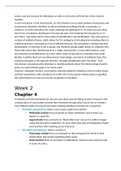course, and also because (b) individuals are able to overcome self-interests if they observe
injustice.
A main conclusion is that theoretically, no strict division can be made between inclusionary and
exclusionary solidarity: identities as well as institutional settings (family, community, or
citizenry), are fluid and define the scope, meaning and significance of ‘to whom we owe what’.
New forms of solidarity developed in the past decades, that challenge the boundaries of ‘us’
and ‘them’, and which ask for new modes of identification and classification. They also ask for a
revision of solidarity theory, which allows for the ambiguity of including and excluding others in
solidarity practices. According to a lot of solidarity theories, the assumption is being made that
identification is restricted to the in-group, and therefore people might adhere to solidarity with
those with whom they identify based on a single characteristic. In real world however, such
one-dimensional identifications are scare which make it important to remember that social
identity is neither fixed nor one-dimensional. Interestingly, new forms of solidarity show that
solidarity also goes in the opposite direction, through identification with ‘the other’. Such
inclusionary out-group justice develops to resettle questions about the shortcomings of public
policy, by superordinate goals or by moral anger.
However, ambiguity remains: social justice-oriented solidarity initiatives confront nation states
and their populations with a tendency to confirm the status quo by making choices regarding
the redistribution of resources and the recognition of identities.
Week 2
Chapter 4
If solidarity sets the boundaries for who we care about and are willing to share resources with,
considerations of social justice provide the framework through which we can do so. Scholars
from different fields of research have been studying questions of justice for a long time:
Normative perspectives: (what a just society ought to be and do)
o Philosophy scholars focus primarily on what constitutes a just society (e.g.,
Rawls) or a good life.
o Legal scholars focus primarily on “black-letter-law”: law as it is written in legal
codes and enacted by legislators. So, they study how laws and legislation should
work and how their working can be improved
Descriptive perspectives: (what a society is)
o Psychology scholars focus on primarily on discerning general trends in what
people think, feel and do regarding justice issues.
o Social scholars focus on primarily on institutional, historical and cultural trends
in issues of justice.
, It is important to know that both the normative and descriptive study of social justice is
fundamental. However, this book focuses mainly on the descriptive study of social justice from
a social sciences perspective. Before we go to the what, how and who of social justice, it is
useful to know the 3 forms of justice that can be distinguished:
Distributive justice (what?) = about the just allocation of burdens and benefits, inputs,
and outcomes.
Procedural justice (how?) = about the fairness of the processes and treatment leading
up to these decisions of allocation of burdens and benefits, inputs, and outcomes.
Justice as recognition (who?) = about the question of who should be considered in
these questions of justice.
Scope of justice = about the notion that justice judgments intersect with questions
concerning identity in such a way that justice judgments always concern specific groups.
1. What is a just distribution of burdens and benefits? (distributive justice)
Most classical research on social justice focused on distribution justice, and a pioneering
theory on distributive justice is equity theory: its basic premise is the proportionality
principle, which entails that people are assumed to judge an outcome as just or fair
when their own outcome-to-input ratio equals a referent outcome-to-input ratio. This
basically means that people prefer equal outcomes for equal inputs in a comparison to
others. To judge whether outcomes are proportional, people can compare current
outcomes to outcomes obtained for similar inputs in the past, or they can compare their
outcomes to those of similar others.
These social comparisons have been the focus of the theory of relative deprivation,
which is the feeling of angry resentment invoked by the judgement that a person or a
group of persons are unfairly disadvantaged compared to a relevant other individual
or group. Relative deprivation consists of 4 elements: (1) a comparison process of which
(2) the outcome is unfavorable to the self or to one’s group, which results in (3) a label
of unfairness as well as (4) negative emotions of angry resentment. Feelings of relative




